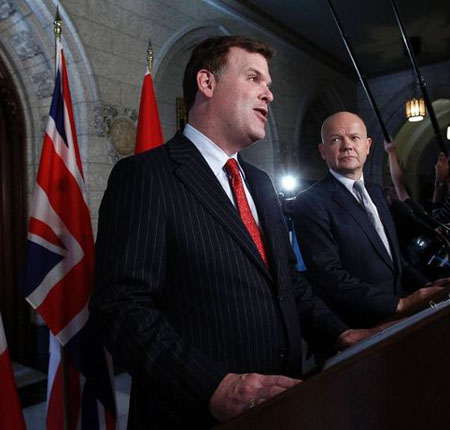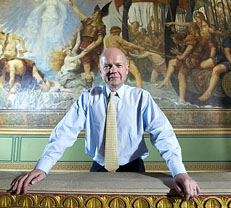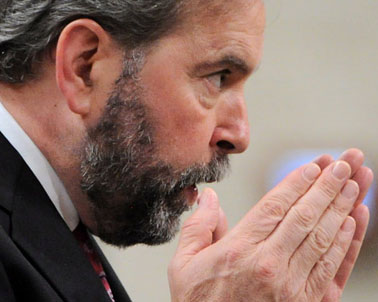Why does so much of English Canada still yearn for comforts of British empire, even in autumn of 2012?
Sep 25th, 2012 | By Randall White | Category: In Brief
Foreign Minister John Baird (L) speaks during a news conference with Britain's Foreign Secretary William Hague on Parliament Hill in Ottawa September 24, 2012. REUTERS/Chris Wattie.
For some Canadians – if opinion polls are to be believed, even for at least a bare majority, coast to coast to coast – the news that “Canada and Britain to run combined embassies” or “Canada, Britain to sign deal to ‘link up’ embassies abroad” or “Canada and Britain to join diplomatic forces” or “Canada, Britain eye joint embassies” will bring sceptical feelings (to say the least).
I confess I am one of them. Generally, of course, there is absolutely nothing wrong with Canada’s making arrangements with other countries for the sharing of diplomatic representation responsibilities in suitable circumstances. I was recently pleased myself, eg, to hear that “Italy to represent Canada in Iran after pullout.” And there has been a “Canada-Australia Consular Services Sharing Agreement” since 1986.
For Canada, however, the United Kingdom, whose Mother of Parliaments first breathed legal life into what we Canadians now call our Constitution Act, 1867, is not just another country. While for some among us this is still apparently a good reason for Canada and Britain to run combined embassies, for others (and again like myself) it is still a very good reason to do no such thing.
As hard as it is for people like me to understand, if you are in the first group you may actually have warmed to the report in this past Saturday’s Daily Mail across the pond. It was headlined “Hague to launch worldwide network of commonwealth embassies to tackle ‘superpower’ EU … Will team up with the three Commonwealth allies … Will look to ‘first cousins’ to rival Brussels.”
* * * *

As explained in Britain’s Daily Mail, with help from such places as Canada and Australia,. UK Foreign Minister William Hague “hopes to secure Britain's place as a world power.”
The report went on: “William Hague will tomorrow launch a worldwide network of British Commonwealth embassies to rival the emergence of the EU as a foreign superpower … The Foreign Secretary is in Canada where he will sign an agreement to open joint UK-Canadian diplomatic missions abroad … He also hopes Australia and New Zealand will join the initiative whereby the four countries will pool their resources to extend their combined influence on world affairs.” The online version of the report included a photo of Mr. Hague, in front of a painting of someone’s past imperial glories, with the caption: “Hitting back … Hague hopes to secure Britain’s place as a world power.”
As it happens, some of this, we are now told on this side of the North Atlantic Squadron (or so it seems), was just misguided media bluster. (Well maybe?) Here in Canada, there were nonetheless at least a few hints of it all in a National Post / Postmedia News report on Sunday, headlined “‘Two nations, but under one Queen,’ UK says; Canada, Britain eye joint embassies.”
Again I still found myself identifying with the opposition criticism that has (happily enough) followed. As in, eg: “Dewar questions our role in joint UK-Canada diplomatic missions” ; “Raising red flags: Plan to share embassies with Britain stirs up critics” ; and (as so nicely summarized in Canada’s “national” English language newsmagazine) : “In the Canadian House of Commons, opposition critics have called the move another attempt to put a colonial, British veneer on Canada’s foreign policy.”

British protesters demonstrating against Canada's tar sands development outside the Canadian High Commission in London. Photo by Zoe Cormier.
All this also brought to my mind a recent posting on the counterweights website itself : “Iran parliamentarians think it is the British queen who has closed Canada’s embassy in Tehran!”And what other countries, I wondered, hearing about the new “joint UK-Canadian diplomatic missions abroad,” are going to jump to similar conclusions about how (as the Iran parliamentarians put it) “Canada is a country supervised by the UK” – as it actually used to be, before the 1931 Statute of Westminister, or the first Canadian Citizenship Act of 1947, or the new Canadian flag of 1965, or the Constitution Act, 1982 and its accompanying Canadian Charter of Rights and Freedoms?
* * * *

NDP leader Thomas Mulcair : “It's all very nice to be nostalgic for the great British empire, but there are limits.”
Even the sometimes remarkably obtuse powers that be in Ottawa these days seem to have quickly enough figured out that the underlying ancient Canadian populist symbolism behind this whole “Canada and Britain to run combined embassies” announcement was starting to get out of hand – and perhaps even give the opposition a little too much of the chewable red meat it currently appears to lack.
See, eg: “Amid criticism, Baird defends Canada-UK shared embassy agreement” ; “Foreign ministers downplay shared Canada-UK embassies” ; “Baird says Canada-UK embassy sharing agreement will be ‘administrative’” ; and “Is Canada-Britain diplomatic resource-sharing a return to colonial past?”
In the last piece here, Doug Sanders at the Globe and Mail has tried to suggest that only the likes of Paul Heinbecker, Canada’s former ambassador to Germany and to the United Nations, are seriously upset by the Canada-UK combined embassies agreement, for reasons that have a lot to do with professional pride. Personally, I just don’t buy this argument – largely because I am upset myself, for essentially populist reasons that have nothing to do with professional diplomacy, and everything to do with what the Osgoode Hall legal scholar Brian Slattery has called the “long process of decolonization that Canada has undergone since 1867.”
At the same time, I also think that those of us who do feel as I do ought to be at least trying to face up to some unpleasant truths about the long process of decolonization in Canada, in the autumn of 2012. Both the Globe and Mail and the CBC websites have been conducting (admittedly unscientific but …) online polls on “Should Canada share embassies with Britain to cut costs?” (Globe) and “Is it a good idea for Canada and the UK to share consular and diplomatic services in other countries?” (CBC). And in both cases something like an even 50% of respondents are answering Yes!
As unscientific as they are, these polls, I think, offer results similar enough to those suggested by a Harris/Decima poll from this past May 2012, which asked more than 2000 representative Canadians “do you agree or disagree that Canada’s Constitution should be changed to make Canada a fully independent country by retiring the British Monarchy as Head of Canada’s federal and provincial governments?”
All told some 52% of all Canadians in this representative sample, from coast to coast, did agree with this statement, and do apparently want to retire the British monarchy in Canada. And I do think this is something that ought to be borne in mind by all those inclined to take too seriously what UK PM David Cameron said to our Canadian Parliament last year – “We are two nations, but under one Queen and united by one set of values.”

British Prime Minister David Cameron address Canadian Parliament in Ottawa, September 22, 2011. ADRIAN WYLD/THE CANADIAN PRESS .
At the same time again, when the results from Quebec – strongly skewed against the British monarchy (and understandably enough) – are removed from the numbers, only between 43% and 46% want to retire the monarchy right now in the other nine provinces.
Those of us in the predominantly English-speaking provinces who strongly believe the “long process of decolonization that Canada has undergone since 1867” must come to some kind of courageous end sooner rather than later still have a lot of work do.

